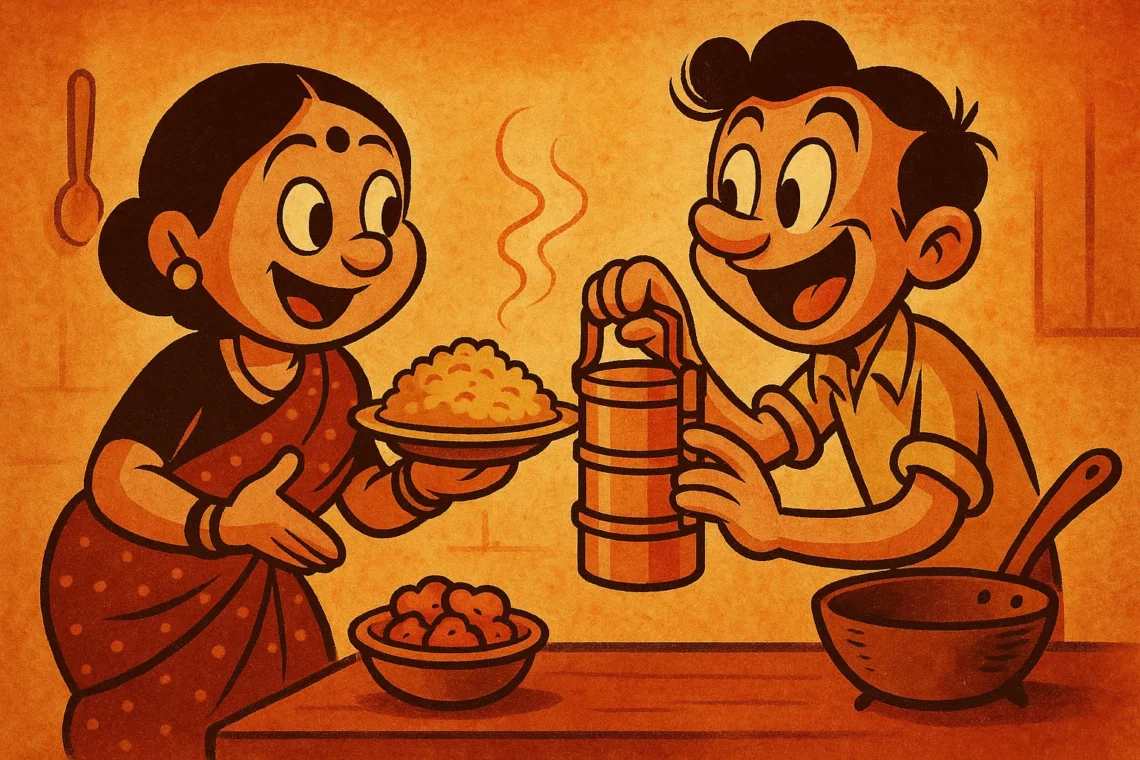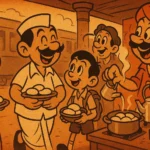There are lunchboxes, and then there are tiffins. A tiffin doesn’t just carry food—it carries the weight of care, of habit, of home. It’s not just a container. It’s a conversation between the person who packed it and the person who will open it, hours later, in a school corridor, an office breakroom, or a train bench somewhere between two cities and two lives. If you grew up with one, you know: a tiffin is rarely just about what’s inside. It’s about who sent it—and what they couldn’t say out loud.
In our house, tiffin packing was a daily ritual. Not dramatic. Not discussed. But steady. Quietly loaded in the morning rush, nestled into cloth bags with zippers that never worked, carried in schoolbags that smelled of notebooks and ink. By the time it was opened at lunchtime, the food had transformed. Not in a bad way—just in that slow, traveled kind of way where the sabzi had settled into its masala, the roti had softened from the steam, and the dal had thickened just a little more. This was food with mileage. And it always tasted better than when it was fresh.
The Language of Tiffins
There’s a certain code that comes with tiffin food. A dry bhindi sabzi meant your mom didn’t want the container to leak. Extra ghee on the paratha meant she knew you had a test. A sneaky laddoo tucked between two rotis? That was love, disguised as dessert. And sometimes, a tiffin was a silent apology—aloo sabzi with extra salt because you left the house in a huff. Or a small bowl of kheer because you hadn’t smiled much the day before. The food said what the words didn’t.
Tiffins were never about surprise. In fact, their charm was in their predictability. The same dabba, the same spoon, the same meals rotating in a rhythm only your mother could decode. And yet, every day, it felt new. Every day, it was welcome. Every day, it was a piece of home that came with you.
Stainless Steel and Sentiment
The physical tiffin itself mattered. Ours was stainless steel, with two or three tiers and clips that locked with a satisfying snap. Slightly dented from years of use, it had our surname scratched into the base with a safety pin—territorial, like a family flag. The top compartment was always for roti. The bottom was the main dish. The middle? That’s where the good stuff lived—cut mangoes, pickles, or a dry sabzi made with more effort than ingredients. Every box had a logic. Every meal had a memory.
And yes, there were plastic boxes too. The kinds with cartoon stickers or fancy compartments. But they never held the same weight. Literally and emotionally. Because the steel tiffin stayed hot longer. It smelled like yesterday’s meals and home in equal measure. It was scratched, loud, and occasionally leaky—but it was real. Just like the people who packed it.
Tiffin as Lifeline
In Mumbai, the dabbawalas have built an entire logistical marvel around this emotion. Tiffins travel across trains, buses, bicycles—without a single label, just codes, routines, and memory. They don’t just deliver lunch. They deliver reassurance. Proof that someone, somewhere, thought about you. Cared enough to send warm food from home to office, across miles and madness. That level of faith—both in system and in sentiment—is unmatched.
Even now, decades later, when I open my own lunchbox in an office thousands of miles from home, I sometimes catch myself doing what I did as a kid—opening it just a little first, taking a whiff, smiling quietly. It’s not the same food. But the emotion? That hasn’t changed.
The Heaviest Thing Is Never the Food
Tiffins have carried more than meals. They’ve carried news—a small note folded under the napkin. They’ve carried tension—an empty compartment when someone was upset. They’ve carried laughter—when a friend stole a bite and called your mother’s cooking “next level.” They’ve even carried grief—when one came home uneaten.
And somehow, through all of it, they’ve remained part of the furniture of our emotional lives. Opening one is an act of remembering. Of acknowledging all the little gestures that make food more than sustenance. Of honoring the effort it takes to cook for someone else—not just what they like, but what they might need that day.
Because when you carry a tiffin, you’re never really alone.
Born in Mumbai, now stir-frying feelings in Texas. Writes about food, memory, and the messy magic in between — mostly to stay hungry, sometimes just to stay sane.












